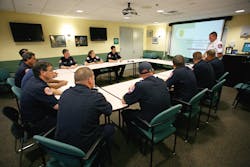Command Post: Going for the Gold: Participative Management
Let's begin this visit to the world of knowledge with a question: How many times have you heard that participatory management is the best way to run your fire department? If you are like me, you have heard that one a great many times. Many management experts have suggested that folks like being asked their opinion. I agree. It is a good thing for a leader to do.
The single-mindedness problem
So here we are in the 21st century, surrounded by some folks who still think it is 1950. This is hard to believe since many were not born until the 1960s or later. My friends, there still exists a group of fire service managers who oppose using a fire department’s collective strength in solving the wide range of problems common to us all. These people use what I have come to call “the single-minded approach to fire department administration.” They want to do it all and let the world know that no one else can do it but them. I know because I have met a number of these Neanderthal nut jobs.
Under this form of management, any idea that does not grow and mature within the single mind that lies inside the head of the fire chief is subject to death. I mean to tell you, there are places where initiative and intelligence are not well appreciated.
In one fire department I remember, there was a standing joke about the fact that there simply had to be a morale officer, even though none could be found on the organizational chart. The members said this because every time the fire chief found any vestige of morale, he always called upon one particular officer to take whatever action was necessary to kill it. That group did not have low morale; they had no morale. Why do you think this happened?
This took place because the people involved were not allowed to have a hand in their own destinies. People like to be respected for what they know and what they can contribute. They even like to enjoy coming to work. In the case we speak of above, people could not even enjoy a hearty laugh at the place where they spend the bulk of their waking hours—the workplace.
While it is probably true that there is precious little room on the fireground for a democratic approach to leadership, what about the time that we spend in a non-emergency status? Might it not be good to allow people to add a bit of personal definition to the many tasks that we perform on a recurring basis?
Participative success stories
I have spent a great deal of time studying a particular combination fire department that holds weekly face-to-face meetings between the fire chief and his staff. The chief there has long valued the merits of participative management. His operational style reflects these strong personal beliefs. He has done this for more than 20 years, even as the organization has grown in size.
This chief likes to operate as a success broker. He believes that if his people feel good about themselves and the fire department, they will work harder and be more productive. Within this context, he insists that each person have an opportunity to speak. He then takes the time to listen.
But, more importantly, he takes the time to write things down and act on those ideas that the group feels have merit. He sees that they are done. His active, ongoing participation gives the whole system credibility. People participate to make things happen. The results are tremendous. Morale is high and productivity is enhanced.
One important change came about through this mechanism of top and bottom interaction when members perceived they were having a problem passing information through the department. Messages were not received and tasks were not accomplished. The firefighters decided that they and the department would benefit from a return to some form of roll call at the shift change.
They felt that this would ensure that information was passed on and assignments were given and understood. So they approached the chief, outlined the problem and presented their proposal. The chief agreed with them and was pleased to use their solution. It made sense and he did not have to force them to do it.
This is but one example of what a charged-up group can produce. Another example comes from a volunteer fire department in New Jersey. A few years ago, the line officers were being snowed under by the many little organizational tasks that can gang up and overwhelm even the most dedicated leader.
The officers of the company were approached by some of the concerned, newer members with a suggestion that committees be formed by the fire chief to parcel out the many tasks to organized, focused groups. A review of the constitution and bylaws could find no prohibition against the chief forming such working committees. This was done and the work spread among five newly formed special committees:
- Firefighting equipment inventory committee
- SCBA committee
- Computer capability committee
- Pre-fire planning committee
- Apparatus maintenance committee
As a result of the efforts of the SCBA committee, all of the SCBA units were logged into an operational database. Their monthly check can be compared with prior months to identify problems. By having a data continuum, problems can be found that might previously have been overlooked.
The same holds true with the other groups. All of their training records have been computerized, as well as the personal and apparatus equipment inventories. The next stage will involve the company maintenance records.
People became involved, their opinions were tested and in many cases, were agreed with and implemented. And, as the old saying goes, many hands made the work light.
Final thoughts
Participatory management makes sense. So let’s get on the bandwagon and spread the good news. My friends, let me suggest that you need to get the ball rolling. Share a decision with a friend. Do it today!
About the Author

Dr. Harry Carter
HARRY R. CARTER, Ph.D., who is a Firehouse contributing editor, is a fire protection consultant based in Adelphia, NJ. He is chairman of the Board of Commissioners in Howell Township Fire District 2 and retired from the Newark, NJ, Fire Department as a battalion commander. Carter has been a member of the Adelphia Fire Company since 1971, serving as chief in 1991. He is a life member and past president of the International Society of Fire Service Instructors and life member of the NFPA. He is the immediate past president of the U.S. branch of the Institution of Fire Engineers (IFE) of Great Britain. Carter holds a Ph.D. in organization and management from Capella University in Minneapolis, MN.
Connect with Harry:
Email: [email protected]
